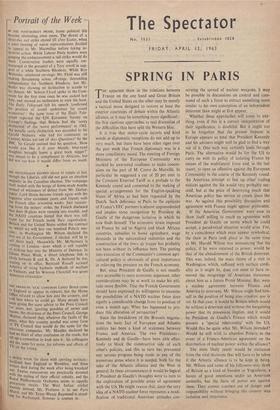— Portrait of the Week —
IN THE POST-BUDGET PHASE, home political life became interesting once more. The threat of a three-day rail strike abated till after Easter, when a joint meeting of union representatives decided to appeal to Mr. Macmillan before taking in- dustrial action. While Labour Party leaders were gauging the embarrassment a rail strike would do them Conservative leaders were equally em- barrassed at the prospect of a Tory revolt in sup- port of a white Southern Rhodesia. While Roy Welensky spluttered on-stage, Mr. Field was still in. aking threatening noises off-stage, demanding Independence for Southern Rhodesia: but Mr. Butler was showing no inclination to accede to his threats. Mr Selwyn Lloyd spoke in the Corn- moos for the first time since he was sacked last "ly, and showed no inclination to rock the boat. The Daily Telegraph felt his speech 'confirmed his position of sound spokesman for sound economics': the same issue of the Daily Tele- graph reported the UN Economic Survey on Europe's findings that Britain had the 'sorry distinction' of the 'worst performance' in 1962. An equally sorry distinction was accorded to Sir Gerald Nabarro. who had his comments on Central Africa cut out of Any Questions? by the BBC. Sir Gerald insisted that his question, 'How would you like it if your blonde, blue-eyed daughter brought home a great buck nigger?' was meant to be a compliment to Africans, but did not say how it would differ from an insult.
MR. DIEEENBAKER SEEMED about to topple at last, though the Liberals still did not gain an absolute majority in the Canadian election. The campaign itself ended with the bangs of home-made bombs instead or whimpers of defeat from Mr. Diefen- baker. Lord Home became friends again with the Japanese after seventeen years, and friends with the French after seventeen weeks. Just recover- ing from the miners' strike, the French disclosed that their H-plans were running into trouble, and the NATO countries hinted that there was still room for the French inside their organisation. Britain and the United States settled the contract by which we will buy one hundred Polaris mis- siles: in Washington Mr. Wilson declared the first act of his Government, if elected. will be to sell them back. Meanwhile Mr. McNamara is coming to London—news which is still capable of striking fear into the Ministry of Defence. In Ghana Peace Week, a direct telephone link is likely between K and K, Dr. A declared he was staying on in office, Bertrand Russell accused 'Illerlea Of using barbaric methods of warfare in Vietnam, and Sir Winston Churchill was given American citizenship THE AMERICAN 'SICK. COMEDIAN Lenny Bruce came to England to appear in cabaret, but the Home Office refused to allow him into the country, and told him, where he could go. Many people have been giving the same advice to the Press Council for years, but, ignoring parables of motes and beams, the chairman of the Press Council, George MikrraY, declared that, whatever the faults of the
Press, what this country needed was some form of Ty Council that would do the same for the
television companies. Mr. Marples declared he 1:lad no fears of utter confusion on the roads, but '!t. up a committee to look into it: his colleagues .cLicl the same for noise, tax reforms and effects of
v on the young.
A "IXEI3 WEEK for those with sporting instincts: Scotland beat England at Wembley, and three boxers died during the week after being knocked out. Twelve racecourses are practically doomed With the ending of their official subsidy, and the Royal Philharmonic Orchestra seems in equally Precarious straits. The West Indian cricket tourists arrived, Mr. Profumo is to sue Paris
ateh. and Mr. Teazy-Weazy Raymond is stand- ing for Parliament. Summer is icumen in.


































 Previous page
Previous page